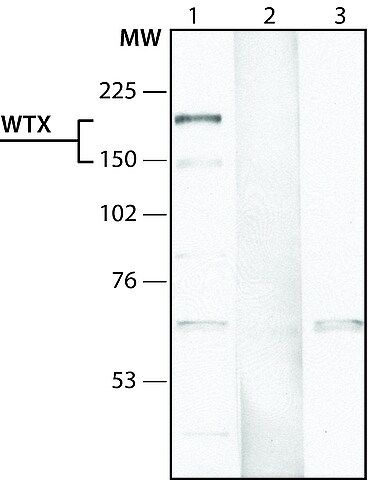您的位置:首页 > 产品中心 > Anti-WTX (N-terminal) antibody produced in rabbit
Anti-WTX (N-terminal) antibody produced in rabbit

产品别名
Anti-WTX (N-terminal) antibody produced in rabbit
Anti-FLJ39827
Anti-AMER1
Anti-FAM123B
Anti-Wilms tumor gene on the X chromosome
Anti-OSCS
基本信息
| NACRES | NA.41 |
| General description【一般描述】 | APC membrane recruitment protein 1 (AMER1) or Wilms Tumor on the X (WTX) gene, also known as FAM123B, comprises adenomatous polyposis coli (APC) interacting domains, nuclear localization signal (NLS), phospholipid binding region, six conserved block sequences and β-catenin binding region. The N-terminal region harbors the internal splicing sites (donor and acceptor). It encodes three isoforms AMER1, AMER2 and AMER3 APC, by alternative splicing at the N-terminus. WTX gene is localized on the X chromosome. The phosphatidylinositol (4,5)-bisphosphate binding site of the WTX aids its localization to the plasma membrane. |
| Specificity【特异性】 | Anti-WTX (N-terminal) specifically recognizes human WTX. |
| Application【应用】 | Anti-WTX (N-terminal) antibody produced in rabbit has been used in chromatin immunoprecipitation and immunoblotting. |
| Biochem/physiol Actions【生化/生理作用】 | APC membrane recruitment protein 1 (AMER1) or WTX is localized in the subnuclear compartment and participates in RNA processing, transcription and cell differentiation. In cultured cells, WTX negatively regulates the WNT/β-catenin signaling by promoting β-catenin ubiquitination and thus targets its degradation by the proteasome. WTX has been shown to form a complex with β-catenin, Axis inhibition protein 1 (AXIN1), β-transducin repeat containing protein 2 (β-TrCP2) and adenomatous polyposis coli (APC). WTX mutations are majorly somatic and the gene deletions and truncations is implicated in 30% of Wilms tumors. The mutations were confined to the active X and single X chromosomes in females and males respectively.. Loss of WTX function in Wilms tumor results in stabilization of β-catenin and its translocation to the nucleus. WTX co-localizes with non-POU domain-containing octamer-binding protein (p54nrb/NONO) and binds Wilms′ tumor protein 1 (WT1) to modulate its activity, suggesting that WTX may play a role in the transcriptional regulation. |
| Physical form【外形】 | Solution in 0.01 M phosphate buffered saline, pH 7.4, containing 15 mM sodium azide. |
产品性质
| biological source【生物来源】 | rabbit |
| conjugate【偶联物】 | unconjugated |
| antibody form【抗体形式】 | affinity isolated antibody |
| antibody product type | primary antibodies |
| clone【克隆】 | polyclonal |
| form【形式】 | buffered aqueous solution |
| mol wt【分子量】 | antigen ~190 kDa |
| species reactivity | human |
| enhanced validation【增强验证】 | recombinant expression Learn more about Antibody Enhanced Validation |
| concentration【浓度】 | ~1.0 mg/mL |
| technique(s) | western blot: 1-2 μg/mL using HEK-293T cell lysates over expressing human WTX. |
| shipped in【运输】 | dry ice |
| storage temp.【储存温度】 | −20℃ |
| Gene Information | human ... FAM123B(139285) |
产品说明
| Storage and Stability【储存及稳定性】 | For continuous use, store at 2–8 ℃ for up to one month. For extended storage, freeze in working aliquots. Repeated freezing and thawing, or storage in “frost-free” freezers, is not recommended. If slight turbidity occurs upon prolonged storage, clarify the solution by centrifugation before use. Working dilutions should be discarded if not used within 12 hours. |
| Disclaimer【免责声明】 | Unless otherwise stated in our catalog or other company documentation accompanying the product(s), our products are intended for research use only and are not to be used for any other purpose, which includes but is not limited to, unauthorized commercial uses, in vitro diagnostic uses, ex vivo or in vivo therapeutic uses or any type of consumption or application to humans or animals. |
安全信息
| Storage Class Code【储存分类代码】 | 12 - Non Combustible Liquids |





